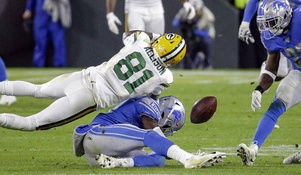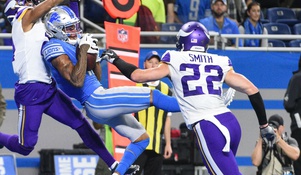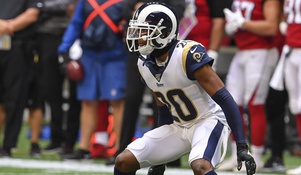The Collapse of the AAF
This article should have been written on Monday.
This article should have been about the Orlando Apollos securing home field advantage for the Alliance of American Football's first Eastern Conference Championship. It should have been about the Birmingham Iron winning the second playoff berth in the East to already set that part of the playoff picture. It should have been about the Salt Lake Stallions defeating the San Diego Fleet to keep their playoff hopes in the Western Conference alive. And it should have been about the Arizona Hotshots going into the Alamodome, the most intimidating venue in the AAF, and beating the host San Antonio Commanders in convincing fashion to draw the West into a dead heat between the Hotshots and Commanders.
But it's not about that.
It's about the suspension of operations, if not the outright folding of the AAF, eight weeks in, not even completing its maiden campaign.
Why? The answer is simple. And complicated.
The simple answer: AAF chairman and primary investor Tom Dundon pulled his financial backing after losing $70 million in operations since his involvement after Week 2, convinced that he would not be able to strike a deal with the National Football League Players Association for the ability to use NFL practice squad players on AAF rosters.
What makes the why complicated are the underlying issues that Dundon either didn't understand or gave less than two figs about.
AAF founders Charlie Ebersol and Bill Polian were the concept men, the ones whose vision was the blueprint to make this new venture a viable television product and a resource for the NFL. But it would take time and money. Their primary investor at the onset, Reggie Fowler (a once aspiring Minnesota Vikings minority investor) of the season backed out after Week 1. The league still had money to pay its obligations, but they needed a fast cash infusion. Enter Dundon, who was reportedly investing $250 million into the Alliance, solving their fiscal woes... temporarily as we would learn. The money was Dundon's to spend, in return for the title of league chairman. It would be reported later that the quarter of a billion dollar quote was nonbinding, that Dundon could walk at any time.
No one foresaw it to be this soon.
After the games in Week 6, reports were stirring that Dundon was not happy with the fact that the NFL players union would not green light a player sharing agreement with the AAF to haul in NFL practice squad players to fill AAF rosters, stating that if an agreement could not be reached in days, then the AAF would view all options, including closing up shop.
This was baffling. How in the world would adding players on the bottom end of NFL rosters make such a difference as to be the breaking point of the solvency of a developmental league? Let's say for the sake of argument that Dundon gets such the access to those players. That is a pool of about 250 players (7 to 8 practice squad players times 32 teams), which would translate into nearly half of an AAF roster with all those players equally distributed. It is unclear on how the infusion of anonymous talent would be that monumental for the Alliance. There are many considerations for the NFLPA to take in such a talent sharing agreement. Football is a brutal sport, where injury can occur on a moment's notice. Say a player under an NFL contract gets seriously hurt, say tearing an anterior cruciate ligament, in an AAF game. Who's on the hook for cost of care and rehabilitation, the contract holders or the owners of the field in which it occurred? Will AAF participation by NFL contracted players be optional or compulsory? Does the NFL pay its contracted players when they suit up in the AAF, or will those players draw checks from the league in which they are currently playing? These things cannot be hashed out in a matter of days. The union has a Collective Bargaining Agreement that they must adhere. It cannot be altered by fiat. The negotiation on a new bargaining agreement is already set to be a highly contentious one, with the likelihood of either a player's strike or owner's lockout being frighteningly high this time around. A talent sharing agreement would be yet another point that players and owners would need to hammer out, nevermind incorporating a new, unvetted partner who is a neophyte in sports ownership and management.
The NFLPA was saying in reports that talks with the AAF were positive, believing that a foundation was being placed.
But the entire building, foundation and all, was imploded by Dundon on April 2.
In the interest of fairness, Dundon did lose a significant amount of money in this abbreviated season, a reported $70 million. If the AAF estimated they would need $20 million to play its remaining regular season games and their three game postseason, that would put the overall bill at $90 million. That would be a higher loss than what the red ink the 2001 XFL spilled in its lone season ($70 million). Seeing the fact that the AAF were not collecting broadcasting rights fees for this opening campaign, the loss amount is about what could have been expected. But Dundon thought otherwise, much to the chagrin of Ebersol and Polian, who made a public statement expressing his disappointment and surprise of the AAF shutting down operations. But we're also finding out that Dundon's money was not following the structure laid out by Ebersol and Polian. Stadium vendors were never paid throughout the season, which assures a civil lawsuit is on the horizon. Players were put up in hotels during the season, with those in Memphis thrown out like squatters because the league did not stay current in payment. Players who were injured were being treated by the league's health care system, but that was cut off when operations ceased, leaving them on their own to pay for expensive care and rehab of those injuries. And let's not forget about the dozens of office personnel, both in football matters and business, the on field officials getting a chance to ply their trade on a national stage, the players and coaches who were either cashing in on a second chance or making hay on one last shot on a football field.
There is only one person that is undeserving of sympathy, richly deserving contempt and scorn, and that is Dundon. Yes, he lost $70 million in a short period of time. But not every investment makes a fast turnaround. An alternative professional football league (the Arena Football League excepted) has not survived past four seasons in over 50 years. There are immense losses that must be absorbed before the chance of turning a profit comes around. Hell, the NFL struggled with teams all finishing in the black all the way to the 1950's. That's over 30 years of taking financial loss before the advent of television gave the NFL a lucrative revenue stream that would make those fiscal worries for their owners a thing of the past. And the demise of this league was not like the United States Football League in the 1980's, where a narcissistic owner whose ulterior motives and flimsy lawsuit that would redefine Pyrrhic victory would be the catalyst thereof. This is about a man taking the mantle of leadership by virtue of his riches, and not only fulfilling fiscal obligations with those working within the league, either internally or with local operators, but then walking away, leaving devastation in his wake, with hundreds of people left to ponder their immediate future, with some in far worse shape than when they entered. And since Dundon has not publicly addressed his decision, he has exemplified both a lack of leadership and cowardice.
It's a chicken shit response for someone who came in like King Shit to ostensibly "save" the AAF from an untimely demise, only to throw a bitch fit because he couldn't sneak into the NFL's backdoor fast enough for his taste. Had he done his homework, he would have known that a big cash loss would be all but assured. But since the basis of his wealth comes from screwing everyday people with subprime loans that were securitized, it's no shock that he would leave everyone whose livelihood was intertwined in the AAF fucked and hanging, left with no money left in pocket while he walks away, not giving a single shit about the lives he destroyed on a whim. On a goddamned whim.
Even in its short life, the Alliance of American Football will give me memories that I will cherish. It is not my style to speak in the first person, but this is the perfect time to make an exception. I am forever grateful for the players and coaches who decided to live the dream and dedicate themselves to this new league, showing a pure, passionate form of this sport I love. I will always remember the Atlanta Legends, Birmingham Iron, Memphis Express, Orlando Apollos, Salt Lake Stallions, San Antonio Commanders, San Diego Fleet, & my beloved Arizona Hotshots fondly.
Long live the AAF.
My apologies for my use of obscenities and vulgarities in the penultimate passage. The raw emotion of this sudden development has overtaken my normally objective point of view. I normally reserve such outbursts on my Twitter account, @GridironEye. Feel free to follow me (parental discretion advised).


